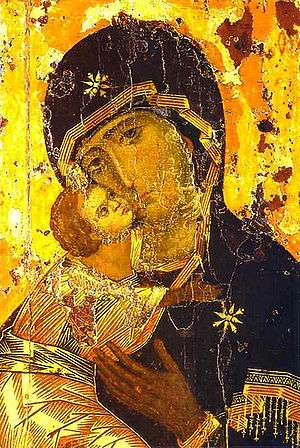Alliance of the Hearts of Jesus and Mary

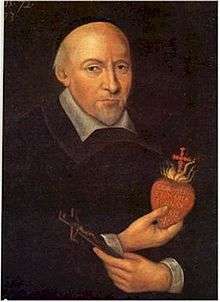
The Alliance of the Hearts of Jesus and Mary refers to the historical, theological and spiritual links in Catholic devotions to the Sacred Heart of Jesus and the Immaculate Heart of Mary. Devotions to the two hearts are key elements of Catholic teachings, and terms such as Holy Heart, Agonizing Heart and Compassionate Heart have also been used in devotions.[2][3][4][5][6]
The joint devotion to the hearts was first formalized in the 17th century by Saint Jean Eudes who organized the scriptural, theological and liturgical sources relating to the devotions and obtained the approbation of the Church, shortly before to the visions of Saint Marguerite Marie Alacoque. He wrote the Mass and Office proper to the feasts, composed various prayers and rosaries and wrote the first book on the topic.[7][8][9] In the 18th and 19th centuries, northern and central France became fertile ground for the growth of devotions to the hearts of Jesus and Mary, both jointly and individually with figures such as Saint Louis de Montfort promoting Mariology and Saint Catherine Labouré's Miraculous Medal depicting the Heart of Jesus thorn-crowned and the Heart of Mary pierced with a sword.[10][11][12]
The devotions, and the associated prayers, continued into the 20th century, e.g. in prayers by Saint Maximillian Kolbe which built on the Montfortean theme of "Jesus through Mary" and the reported messages of Our Lady of Fátima which stated that the Heart of Jesus wishes to be honored together with the Heart of Mary.[13][14]
Popes supported the individual and joint devotions to the hearts through the centuries. In the 1956 encyclical Haurietis aquas, Pope Pius XII encouraged the joint devotion to the hearts. In the 1979 encyclical Redemptor hominis Pope John Paul II explained the theme of unity of Mary's Immaculate Heart with the Sacred Heart.[1] In his Angelus address on September 15, 1985 Pope John Paul II coined the term The Alliance of the Hearts of Jesus and Mary, and in 1986 addressed the international conference on that topic held at Fátima, Portugal.[15][16][17][18]
History
The Hearts of Jesus and Mary are mentioned explicitly only briefly in the New Testament. Luke 2:19 states: "Mary kept all these things pondering them in her heart", and Luke 2:51: "His Mother kept all these things carefully in Her Heart". John 7:38 refers to the heart of Jesus: "From His Heart will flow rivers of living water." From the 2nd century onward, according to the Venerable Pope Pius XII, saints and Church Fathers occasionally referred to the two Hearts.[19]
Devotion to the Sacred Heart of Jesus on its own dates back to the 11th century and was addressed by Saint Bernard of Clairvaux and Saint Gertrude the Great in the 12th and 13th centuries. Saint Bonaventure referred to the Heart of Jesus and the Heart of Mary throughout his writings during the 13th century, but the most poignant passage is in the devotional work The Mystical Vine, a description of the Passion of Christ.[19]
The joint devotion to the Hearts of Jesus and Mary formally started in the 17th century. Saint Jean Eudes (1601–1680) established the Society of the Heart of the Mother Most Admirable, which resembled the Third Order of Saint Francis and dedicated the seminary chapels of Caen and Coutances to the Sacred Hearts. Although Jean Eudes always associated the two Sacred Hearts, he began his devotional teachings with the Heart of Mary, and then extended it to the Sacred Heart of Jesus.[20] Eudes was partly influenced by the writings of Saint Francis de Sales on the perfections of the Heart of Mary as the model of love for God.[21]

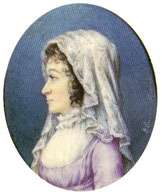
Jean Eudes organized the scriptural, theological and liturgical sources relating to the Sacred Hearts of Jesus and Mary and promoted them with the approbation of the Church. The feast of the Holy Heart of Mary was celebrated for the first time in 1648, and that of the Sacred Heart of Jesus in 1670. The Mass and Office proper to these feasts were composed by Saint Jean Eudes in 1668, briefly preceding Saint Marguerite Marie Alacoque in establishing the devotion to the Sacred Hearts. He composed various prayers and rosaries to the Sacred Hearts. His book "Le Cœur Admirable de la Très Sainte Mère de Dieu" is the first book ever written on the devotion to the Sacred Hearts.[7][8][9]
In December 1673 Saint Marguerite Marie Alacoque reported vision of Christ in which Jesus showed her the Sacred Heart.[22] After her death in 1690, the devotion was promoted by the Jesuits. Devotion to the two Hearts continued to spread in France. On Christmas Eve in 1800, amid the French Revolution, knowing they could face the guillotine for their actions, Peter Coudrin and Henriette Aymer de Chevalerie established the Congregation of the Sacred Hearts of Jesus and Mary with a mission to spread the message of God's love manifested through the Hearts of Jesus and Mary and through the adoration of the Blessed Sacrament. Future members of the congregation included Saint Damien de Veuster of Molokai. By the beginning of the 19th century the devotion to the Immaculate Heart was sufficiently widespread in Europe for Pope Pius VII to allow a feast to honor it in 1805.[23]
In November 1830 Saint Catherine Labouré reported a vision which resulted the introduction of the Miraculous Medal, depicting the thorn-crowned Heart of Jesus and the pierced Heart of Mary.[24] Since the 19th century there has been a steady increase in Roman Catholic devotion to the Heart of Mary, and devotional images of the Virgin Mary pointing to Her sinlessly glowing Heart have become widespread.[25] Many images of the Immaculate Heart of Mary still show it as pierced or wounded and, in some cases, as bleeding.[26] Other orders and devotions continued thereafter; for example, the Order of the Sisters of the Sacred Hearts of Jesus and Mary was founded in 1866 by Father Victor Braun.
Pope Pius XII consecrated the human race to the Immaculate Heart on December 8, 1942. In 1944 he extended the feast to the universal Church and set its date of celebration on August 22. Because August 22 is now the feast of Queenship of Mary, the feast of the Immaculate heart is celebrated the day after the Sacred Heart.[23]
Joint devotions and prayers
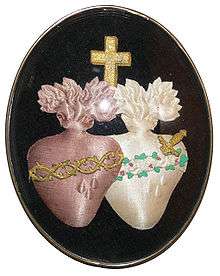
Devotions to the Sacred Heart of Jesus and to the Immaculate Heart of Mary are linked in historical, theological and spiritual ways. Terms such as the Holy Heart, Agonizing Heart and Compassionate Heart have also been used in devotions.[2][3][4][6][16]
In Catholic teachings, the object of the devotion to the Heart of Mary is her physical Heart that burned so intensely with love for God. Because of the inherently close relationship of Mary and Jesus in the Catholic teachings on salvation, the Heart of Mary is associated with the Heart of Jesus.[27] The Sacred Heart is viewed as the source of God's boundless love and charity, while the devotion to the Immaculate Heart stresses the nature of Mary's love and concern for all who call upon her.[28]
Theologian Mark Miravalle explains the link between the two Hearts as follows: "As Mary is always the pure channel of grace, which flows from Jesus and to Jesus, her Immaculate Heart is the perfect channel to Christ's most Sacred Heart, source and symbol of the infinite love and charity of God."[29] The two Hearts are linked by devotions, prayers and feasts. The Catholic Feast of the Immaculate Heart, which is on a Saturday, is celebrated the day after the Feast of the Sacred Heart which always falls on a Friday, 19 days after Pentecost.[30] Catholic devotional guides encourage the faithful to honor them together in celebration of God's generous love.[11][31]
The link and the relationship between the Hearts of Jesus and Mary is also manifested in various Catholic prayers. The conclusion to the Litany of the Sacred Heart of Mary is an example:
O most merciful God, Who, for the salvation of sinners and the refuge of the miserable, wast pleased that the Immaculate Heart of the Blessed Virgin Mary should be most like in charity and pity to the Divine Heart of Thy Son Jesus Christ; grant that we, who commemorate this most sweet and loving Heart, may by the merits and intercession of the same Blessed Virgin merit to be found according to the Heart of Jesus. Through the same Christ our Lord. Amen.[32]
Prayers to the Agonizing Heart of Jesus also relate it to the Heart of Mary:
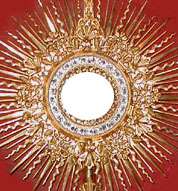
Agonizing Heart of Jesus, Beloved of the Father, Living Temple of the Holy Spirit, delight of the Immaculate Heart of Mary - I adore Thee and I love Thee, have pity on the dying.[33]
Mary conceived without sin, pray for us, who trust in Thee. Praised be the Agonizing Heart of Jesus! Praised be the Compassionate Heart of Mary![34]
A third devotional element often associated with the Hearts of Jesus and Mary is the Body and Blood of Christ represented in the Eucharist. In Catholic teachings, the Blood and Water flowing from the Heart of Jesus are signs of the seven sacraments, in particular the sacraments of Baptism and Eucharist. The view of the sacraments as gifts to the Church positions the Hearts as the primary channel of Christ's boundless love and Mary's endless compassion.[35] As an example, the morning offering prayer to the Immaculate Heart relates it to both the Blood of Christ and Sacred Heart:
My God, in union with the Immaculate Heart of Mary I offer Thee the Precious Blood of Jesus from all the altars throughout the world, joining with it the offering of my every thought, action and suffering of this day. O my Jesus, I desire today and every day of my life to gain every indulgence and merit I can, and offer them together with myself, to Mary Immaculate, that She may best apply them to the interests of Thy most Sacred Heart.[36]
| Part of a series on |
| Acts of reparation of the Catholic Church |
|---|
_basilica_inferiore_di_assisi_(1310-1329).jpg) Fresco detail by Pietro Lorenzetti. |
| Acts |
|
|
Catholic devotional teachings encourage the faithful receiving the Eucharist to unite their own hearts to those of Jesus and Mary.[37]
The Morning offering to the Sacred Heart of Jesus specifically refers to the Immaculate Heart of Mary as it seeks reparation for sins:[38][39][40]
- O Jesus through the Immaculate Heart of Mary,
- I offer You my prayers, works, joys, sufferings of this day,
- in union with the Holy Sacrifice of the Mass throughout the world.
- I offer them for all the intentions of Your Sacred Heart:
- the salvation of souls, the reparation for sin, the reunion of Christians;
- and in particular for the intentions of the Holy Father this month.
- Amen.
Saints and the Blessed
Since the 17th century, the devotions to the Hearts of Jesus and Mary, individually and jointly, have been promoted and encouraged by a number of saints and the blessed. While Saint Jean Eudes was the main force in formalizing and promoting the joint devotion to the Hearts of Jesus and Mary, the efforts of other saints prepared the environment in which the devotion could flourish. Pope Leo XIII gave Jean Eudes the title of "Author of the Liturgical Worship of the Sacred Heart of Jesus and Holy Heart of Mary" and both popes Leo XIII and Pius X called Eudes the "father, teacher and first apostle" of devotions to the Hearts of Jesus and Mary.[1][7][20]

In the 18th and 19th centuries, northern and central France became fertile ground for the growth of devotions to the Hearts of Jesus and Mary. In June 1700, a young Louis Grignion de Montfort was ordained a priest and was assigned to Nantes. He became a fervent preacher for devotion to the Sacred Heart of Mary. Although Montfort died in 1716, his teachings shaped Mariology and later influenced several popes.[10][11] In 1830 in Paris, Saint Catherine Labouré reported a vision in which she saw the Sacred Heart of Jesus and Immaculate Heart of Mary, the Heart of Jesus thorn-crowned and the Heart of Mary pierced with a sword.[12]
The devotions, and the associated prayers, continued into the 20th century. The Immaculata prayer by Saint Maximillian Kolbe builds on the Montfortean theme of "Jesus through Mary". It ends as follows:
For wherever You enter You obtain the grace of conversion and growth in holiness, since it is through Your hands that all graces come to us from the most Sacred Heart of Jesus. Allow me to praise You, O Sacred Virgin, Give me strength against Your enemies. Amen.[41]
The three children who reported the messages of Our Lady of Fátima emphasized the links between the two Hearts and stated that the Heart of Jesus wishes to be honored together with the Heart of Mary.[13] In 1920, shortly before her death at age 9, Blessed Jacinta Marto, one of the three children of the Our Lady of Fátima apparitions reportedly discussed the Hearts of Jesus and Mary with a then 12-year-old cousin Lúcia dos Santos, another one of the three children, and said:
When you are to say this, don't go and hide. Tell everybody that God grants us graces through the Immaculate Heart of Mary; that people are to ask Her for them; and that the Heart of Jesus wants the Immaculate Heart of Mary to be venerated at His side. Tell them also to pray to the Immaculate Heart of Mary for peace, since God entrusted it to Her.[14]
Lúcia dos Santos later became a nun called Sister Lúcia of Jesus and of the Immaculate Heart.[42]
Popes
_001.jpg)
Throughout the centuries, the Catholic Church and several popes have supported the individual devotions to the Hearts of Jesus and Mary, as well as the joint devotion. Even before the beginning of private revelations of the Sacred Hearts of Jesus and Mary, St. John Eudes had obtained from the ecclesiastical permission to celebrate the Feast of the Heart of Mary in 1648.[19]
In 1765, devotion to the Sacred Heart of Jesus was formally approved. In 1799 Pope Pius VI permitted a Feast of the Heart of Mary in Palermo, Sicily and in 1805 Pope Pius VII extended it throughout the world. In 1855, an Office and Mass in honor of the Most Pure Heart of Mary was permitted for the universal Church. Pope Pius IX extended the Feast of the Sacred Heart of Jesus to the entire Catholic Church in 1858.[19]
Pope Leo XIII approved the litany to the Sacred Heart of Jesus. In the encyclical Annum sacrum (which entered new theological territory by consecrating non-Christians), he consecrated the entire world to the Sacred Heart.[43]
The consecration was due to the messages from Jesus reported by a nun, Blessed Mary of the Divine Heart. Pope Leo XIII performed the requested consecration a few days after the death of Sister Mary and called it "the greatest act of my pontificate".[43]
Pope Pius XII instituted the Feast of the Immaculate Heart of Mary for the universal Church in 1945. In the 1956 encyclical Haurietis aquas, he stated:[44]
In order that favors in great abundance may flow on all Christians, nay, on the whole human race, from the devotion to the most Sacred Heart of Jesus, let the faithful see to it that to this devotion the Immaculate Heart of the Mother of God is closely joined.
In the 1979 encyclical Redemptor hominis (item 22), Pope John Paul II explained the theme of unity of Mary's Immaculate Heart with the Sacred Heart.:[1]
We can say that the mystery of the Redemption took shape beneath the heart of the Virgin of Nazareth when she pronounced her "fiat". From then on, under the special influence of the Holy Spirit, this heart, the heart of both a virgin and a mother, has always followed the work of her Son and has gone out to all those whom Christ has embraced and continues to embrace with inexhaustible love.[45]
Pope John Paul II stated that: "devotion to the Sacred Heart of Jesus and to the Immaculate Heart of Mary has been an important part of the sensus fidei of the People of God".[15] In his Angelus address on September 15, 1985, Pope John Paul II coined the term The Alliance of the Hearts of Jesus and Mary, and in 1986 addressed the international conference on that topic held at Fátima, Portugal.[15][16][17][18] He often invoked the Sacred and Immaculate Hearts together and at the beginning of the 21st century encouraged all nations to "consecrate themselves to the Sacred Heart of Jesus and the Immaculate Heart of Mary".[46]
See also
Further reading
- The Theology of the Alliance of the Two Hearts: Documents of the 1997 International Theological Pastoral Symposium on the Alliance of the Hearts of Jesus and Mary, edited by Édouard Gagnon, René Laurentin Published by Two Hearts Media Org., 1997 ISBN 971-602-047-3
Notes
| A series of articles on the |
| Sacred Heart of Jesus |
|---|
 |
| Devotions |
| People |
| Encyclicals |
| Churches |
|
|
- 1 2 3 4 Peter Stravinskas, 2002, Catholic Dictionary, OSV Press ISBN 978-0-87973-390-2 page 485
- 1 2 Mary's Immaculate Heart by John F. Murphy 2007 ISBN 1-4067-3409-8 pages 59-60
- 1 2 Heart of the Redeemer by Timothy Terrance O'Donnell, 1992 ISBN 0-89870-396-4 page 272
- 1 2 Arthur Calkins, The Theology of the Alliance of the Two Hearts, Missio Immaculatae (English Edition) Year III, N° 4 (May to December 2007).
- ↑ The Alliance of the Hearts of Jesus and Mary: Hope for the World by Michael O'Carroll, 2007, Queenship Publishing ISBN 1-882972-98-8
- 1 2 Sacred Heart of Jesus by Stephen J. Binz 2006 ISBN 1-58595-597-3 page 97
- 1 2 3 Roman Catholic worship: Trent to today by James F. White 2003 ISBN 0-8146-6194-7 page 34
- 1 2 From Trent to Vatican II: historical and theological investigations by Raymond F. Bulman, Frederick J. Parrella 2006 ISBN 0-19-517807-6 page 182
- 1 2 Praying with the saints by Woodeene Koenig-Bricker 2001 ISBN 0-8294-1755-9 page 134
- 1 2 In Prayer With Mary the Mother of Jesus by Jean Lafrance 1988 ISBN 2-89039-183-3 page 310
- 1 2 3 Companion to the Calendar: A Guide to the Saints and Mysteries by Mary Ellen Hynes 2007 ISBN 1-56854-011-6 page 24
- 1 2 Butler's lives of the saints, Volume 12 by Alban Butler, Kathleen Jones, 2000 ISBN 0-86012-261-1 page 245
- 1 2 Youngest Prophet by Christopher Rengers 1998 ISBN 0-85342-815-8 page 38
- 1 2 The children of Fatima: Blessed Francisco & Blessed Jacinta Marto by Leo Madigan 2003 OSV Press ISBN 1-931709-57-2 page 248
- 1 2 3 Pope John Paul II 1986 Speech at the Vatican Website
- 1 2 3 Arthur Calkins, The Alliance of the Two Hearts and Consecration, Miles Immaculatae XXXI (July/December 1995) 389-407.
- 1 2 Vatican website: Pope John Paul II Angelus address of September 15, 1985 (Spanish and Italian)
- 1 2 Proceedings of the International Theological Symposium on the Alliance of the Hearts of Jesus and Mary, September 1986, Fatima, Portugal
- 1 2 3 4 EWTN on the Hearts of Jesus and Mary
- 1 2 Life Of The Venerable John Eudes by Charles De Montzey, Cousens Press 2008, ISBN 1-4097-0537-4 page 215
- ↑ Mary's Immaculate Heart by John F. Murphy 2007 ISBN 1-4067-3409-8 page 24
- ↑ Life of Blessed Margaret Mary Alacoque of the Sacred Heart by Albert Barry 2008 ISBN 1-4097-0526-9 page 72
- 1 2 Saints and feasts of the liturgical year by Joseph N. Tylenda 2003 ISBN 0-87840-399-X page 118
- ↑ Raymond Burke, 2008, Mariology: A Guide for Priests, Deacons,seminarians, and Consecrated Persons, Queenship Publishing ISBN 1-57918-355-7 pages 842-843
- ↑ Fundamentals of Catholicism: God, Trinity, Creation, Christ, Mary by Kenneth Baker 1983 ISBN 0-89870-019-1 page 382
- ↑ Michael Freze, 1989, They Bore the Wounds of Christ, OSV Publishing ISBN 0-87973-422-1 page 33
- ↑ Fundamentals of Catholicism: God, Trinity, Creation, Christ, Mary by Kenneth Baker 1983 ISBN 0-89870-019-1 pages 382=383
- ↑ An introductory dictionary of theology and religious studies by Orlando O. Espín, James B. Nickoloff ISBN 0-8146-5856-3 page 610
- ↑ Mark Miravalle, 1993, Introduction to Mary, Queenship Publishing ISBN 978-1-882972-06-7, page 169
- ↑ Calendarium Romanum (Libreria Editrice Vaticana, 1969), pp. 94, 135
- ↑ Clean of Heart by Rosemarie Scott 2006 ISBN 0-9772234-5-0 page 53
- ↑ The Catholic's vade-mecum: a select manual of prayers for daily use London 1851, Published by Burns and Lambert ASIN B002JPK7N4 page 337
- ↑ Perpetual Intercession to the Agonizing Heart of Jesus by Jean Lyonnard 2009 ISBN 1-103-36029-9 page 77
- ↑ Perpetual Intercession to the Agonizing Heart of Jesus by Jean Lyonnard 2009 ISBN 1-103-36029-9 page 111
- ↑ Heart of the Redeemer by Timothy Terrance O'Donnell, 1992 ISBN 0-89870-396-4 page 275
- ↑ A collection of my Favorite Prayers by G. P. Geoghegan, 2006 ISBN 978-1-4357-2845-5 page 83
- ↑ Raymond Burke, 2008, Mariology: A Guide for Priests, Deacons,seminarians, and Consecrated Persons, Queenship Publishing ISBN 1-57918-355-7 page 272
- ↑ The how-to book of Catholic devotions: by Mike Aquilina, Regis J. Flaherty, 2000 ISBN 0-87973-415-9 page 29
- ↑ Hearts on fire: praying with Jesuits by Michael Harter 2005 ISBN 0-8294-2120-3 page 13
- ↑ Handbook of Prayers 2006 by James Socías ISBN 0-87973-579-1 page 42
- ↑ University of Dayton
- ↑ Saint Companions for Each Day by A. J. M. & J. K. Mousolfe 2002 ISBN 81-7109-092-3 pages 74-75
- 1 2 Catholic encyclopedia
- ↑ Haurietis aquas on the Vatican web site
- ↑ Redemptor hominis at the Vatican web site
- ↑ Pope John Paul II: Jubilee in the World: 2000 at the Vatican Website

